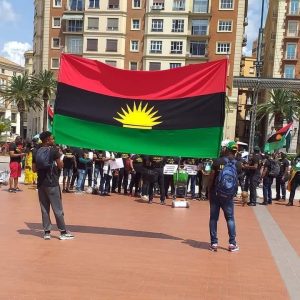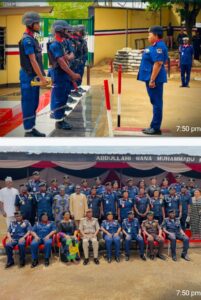DEADLY HERDSMEN; HOW THEY SET THE NATION ON THE EDGE

The move to establish grazing routes and reserves by the federal parliament to frequent violent clashes between nomadic herdsmen and their host communities is generating widespread criticism in the land. Security Monitor’s Head of Northern Operations, Dirisu Yakubu takes a look at the controversial bill and the growing opposition threatening the life of the proposed law.
With the possible exception of the biting economic squeeze made worse by the incessant controversy surrounding the 2016 federal budget, no issue dominated public discourse in recent time than the controversial National Grazing Reserve Bill. The bone of contention is not much as the necessity of the bill as the provisions therein, with commentators and critical stakeholders calling for the immediate withdrawal of the proposed law to nip in the bud, a huge calamity of national proportion lurking around. One way or the other, a legislative input is key to stem the tide of the frequent violent clashes involving Fulani herdsmen and farmers across the South and North of the Nigerian divide.
 Readers would recall that in September 2015, elder statesman and former Secretary to the Government of the Federation (SGF), Chief Olu Falae was abducted by a criminal gang of Fulani herdsmen at his Ilapo farm, located at the outskirt of Akure, Capital of Ondo State, South-West Nigeria. After spending days in his abductors’ den with undisclosed sum of money paid to his abductors; the Yale-trained economist was finally released, much to the joy of his family, Ondo State and the country at large. The condemnation that greeted that monumental tragedy was still fresh in the memory when herdsmen invaded Agatu, an agrarian community in Benue State, North-Central Nigeria, killing more than 800 people. Spokespersons of government and members of the National Assembly condemned in strong terms, the human carnage even as they called for the arrest and immediate prosecution of the masterminds to act as deterrent to others. So pained was David Mark that the Senator likened the bloodbath in Agatu to a genocide. And to a large extent, the retired soldier-turned politician was right in the usage of that term.
Readers would recall that in September 2015, elder statesman and former Secretary to the Government of the Federation (SGF), Chief Olu Falae was abducted by a criminal gang of Fulani herdsmen at his Ilapo farm, located at the outskirt of Akure, Capital of Ondo State, South-West Nigeria. After spending days in his abductors’ den with undisclosed sum of money paid to his abductors; the Yale-trained economist was finally released, much to the joy of his family, Ondo State and the country at large. The condemnation that greeted that monumental tragedy was still fresh in the memory when herdsmen invaded Agatu, an agrarian community in Benue State, North-Central Nigeria, killing more than 800 people. Spokespersons of government and members of the National Assembly condemned in strong terms, the human carnage even as they called for the arrest and immediate prosecution of the masterminds to act as deterrent to others. So pained was David Mark that the Senator likened the bloodbath in Agatu to a genocide. And to a large extent, the retired soldier-turned politician was right in the usage of that term.
As has always been the case, security operatives vowed to arrest the masterminds of the dastardly act, saying it had unearthed useful information that would lead to reliable prosecution of all those involved in the unfortunate incident. Week after week, this ‘useful information’ is yet to provide any form of mileage for investigation, prompting analysts to argue the government of President Muhammadu Buhari is paying lip service to protection of lives and properties. Only recently, suspected Fulani herdsmen, apparently basking in the euphoria of their evasiveness thus far in the hands of security operatives, invaded Nimbo community in Uzo Uwani Local Government Area of Enugu State with sophisticated weapons and by the time guns were silent, at least 40 people laid dead, not to mention innumerable property, including houses, that were razed by the rampaging hoodlums. A mourning Ifeanyi Ugwuanyi, governor of Enugu State did not mince words in fingering security agencies for blame, saying had they lived to the expectation of the people of the state; the tragedy could have been averted.
 A fortnight ago, Hon. Sadiq Ibrahim (APC, Adamawa State), a member of the House of Representatives introduced the National Grazing Reserve Establishment Bill 2016 which intent is the establishment of a commission “to undertake and make regulations to establish at least one cattle reserve in each state of the federation.” Also introduced on November 16, 2015 was the National Grazing routes and Reserve (Establishment) Bill by Hon. Sunday Karimi (PDP, Kogi State). Karimi’s bill has already passed first reading even as its prayer for “the establishment of a commission to control and manage grazing routes and reserves in all parts of the country” is generating disquiet especially in the Southern part of the country. This is so as the bill when passed into law would enable government take over lands from their original owners and use same for grazing purposes, provided compensation is paid to the latter. In the reckoning of the legislator, this bill is all Nigeria needs to tackle the incessant clashes between farmers and herdsmen in the country.
A fortnight ago, Hon. Sadiq Ibrahim (APC, Adamawa State), a member of the House of Representatives introduced the National Grazing Reserve Establishment Bill 2016 which intent is the establishment of a commission “to undertake and make regulations to establish at least one cattle reserve in each state of the federation.” Also introduced on November 16, 2015 was the National Grazing routes and Reserve (Establishment) Bill by Hon. Sunday Karimi (PDP, Kogi State). Karimi’s bill has already passed first reading even as its prayer for “the establishment of a commission to control and manage grazing routes and reserves in all parts of the country” is generating disquiet especially in the Southern part of the country. This is so as the bill when passed into law would enable government take over lands from their original owners and use same for grazing purposes, provided compensation is paid to the latter. In the reckoning of the legislator, this bill is all Nigeria needs to tackle the incessant clashes between farmers and herdsmen in the country.
The recent attack in the South-East has succeeded in exposing the hypocrisy of elected leaders, many of whom find it difficult to wean their reasoning from ethnic and religious coloration. Not surprisingly therefore, notable politicians of northern extraction want Nigerians to desist from labeling those behind the Nimbo attack as Fulani, saying the stick-bearing herdsmen are peace-loving people not given to violence of any form.
Rising from an emergency meeting in Kaduna penultimate Friday, governors of the 19 states under the aegis of the Northern States Governors’ Forum (NSGF) condemn the killings but warned against ethic profiling of the bandits. The forum chairman and governor of Borno State, Kashim Shettima described as unacceptable the labeling of Fulani people as criminals, stressing that doing so would further make an already terrible situation worse. “We want to unequivocally condemn the recent killings in Enugu and other parts of the country. But we equally condemn the politicization or permit me, the ‘ethnicization’ of the whole crisis. It goes beyond Fulani,” Governor Shettima told newsmen in Kaduna at the end of the close-door meeting. And as if, such a premise was what was needed to launch the ‘leave-Fulani-alone’ campaign; more prominent sons of Arewa soon aligned their position with the NSGF chairman.
At a plenary session penultimate week, Hon. Adamu Chika (APC, Niger State) in his contribution on the floor of the House noted that until investigations were concluded, it would be wrong to assume that the perpetrators of the heinous crime are Fulani. Similarly, Hon. Aminu Shehu Shagari (APC, Sokoto) noted that the porous land borders have made it easier for marauders to invade the country disguising as Fulani, arguing that cattle breeders in the country are not in the least, violent. When however the bill came up for mention, condemnation of its provisions came largely from the South as many legislators vowed to ensure its death. For instance, House Minority Leader, Leo Ogor said the practice of migrating from one part of the country to the other by Fulani herdsmen and their cattle must stop, urging those in the business of cattle farming to establish their own reserves instead. “We have to bring in modernization,” submitted Ogor, adding that “the idea of moving from one place to another with cattle should be discouraged. Everyone who wants to raise cattle should have his own farm or reserve.” Worried by the provision of the proposed law dealing with land acquisition, Ondo State governor, Dr. Olusegun Mimiko last week described the bill as dead on arrival, insisting that the choice before the federal lawmakers is to stop further debate on it. According to Mimiko, no state governor worth his salt would give nod to such a problematic bill because it would end up throwing up more problems than it is meant to solve. His words, “I see the Grazing Reserve Bill aggravating the problem, though I have not read the law but I do not see how that law can find comfort with the Land Use Act. The control of land is vested in the governor of the state. I do not see any federal law that will compulsorily acquire any land from ay state government. In my state for example, it cannot work…”
Earlier in the week, the Christian Association of Nigeria (CAN) in a memorandum to the House, called for committed dialogue on the part of all stakeholders to proffer lasting solution to the problem, noting that the proposed bill, if passed into law would create division, capable of snowballing into existential threat for the nation. “In order to alleviate and prove our fears wrong, such a bill should never be passed into motion because it is not a legislative issue. We are of the opinion that there should be constant dialogue with all stakeholders to formulate a holistic plan that will promote peace, harmony and advancement of our livestock industry, so that we do not divide Nigeria into Southeria and Northeria either overtly or covertly,” submitted CAN in its memorandum to the House Committee on Agricultural Production and Services last week. CAN is not alone on this path as an ex-minister who claimed to be influenced by the Holy Spirit on the matter recently described the contentious bill as “The greatest evil of all.”
Femi Fani-Kayode (FFK) is an enigma of sort. Love or hate him, he states his position on any burning issue without fear of any possible flak from the public. One of the most consistent critics of incumbent administration; FFK was on hand recently to warn of the dire consequences of passing the controversial bill into law. In an article published in some online platforms and traditional tabloids entitled, “The Greatest Evil of All,” FFK said the nation would become history if by sheer docility or cowardice, the bill is given the nod to sail through legislative scrutiny. He wrote, “When you create a conflict which has its roots in religion, ethnicity, land rights, the attempt to marginalize, dominate, subjugate and conquer others and the quest for liberation and freedom from slavery and bondage all mixed into one, you are toying with a conflagration that will not only affect the whole of Africa but will also last for the next 50 years.” Unlike his position on issues dealing with politics, the former minister said his words this time are indeed prophetic. “I am speaking prophetically and I am saying this under the leading guidance of the Holy Spirit. If that bill is ever passed and implemented, two years from that time, we will regret it deeply as a nation because it will result in nothing but conflict, chaos and strife between the Fulani herdsmen and settlers on the one hand and the local indigenous population on the other,” he added.
Possible way out
Today, the contentious bill is seen in some quarters as an attempt to deprive the South access to land, the provision of compensation notwithstanding. This will not go down well with farmers in the South, many of whom condemn President Buhari’s silence on the activities of his kinsmen until the eleventh hour. The consensus amongst Nigerians is that ranches should be created to make movement of the nomadic Fulani from one part of the country to the other unnecessary. According to the Senior Special Adviser to the President on Media and Publicity, Femi Adesina; government is ready to set up ranches within the shortest possible time. “When you set up ranches in different states, cattle rarers don’t have to drive their cattle in the wild again and in the process get into the farms of some people and destroy their crops. When you set up ranches, it then becomes illegal for anybody to drive his cattle openly,” Adesina stated recently. Whatever measure government comes up with in the next few weeks, perpetrators of the Nimbo tragedy must be made the face justice, if only to warn perpetrators of crime that Nigeria is not prepared to accommodate their conduct anymore.








